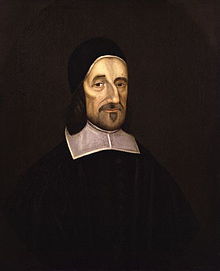Millennialism in the 17th Century
In the early seventeenth century the leading advocates of the future millennium were English scholars Thomas Brightman and Joseph Mede.
In 1691, Richard Baxter observed that after a century of discussion about the millenium, “no consensus had … been achieved concerning whether the golden age would be literal or spiritual, in heaven or on earth, or, indeed, about whether the millennium was to occur in the past, present, or future.” He wrote: [1]

Richard Baxter
It is a marvel that the great disagreement of the Millenaries among themselves … hindereth not their seeming Concord, while they can but cry up the Thousand years Reign, though most of them know not what the words mean. … some of them say, The Thousand years are on Earth; and some say, They are only the Souls of the Martyrs and Confessors in Heaven: Some say, They are both in Heaven, or in the Air, and on Earth at once … some say, That they shall be a Jewish Monarchy at Jerusalem, and some, That it shall be of the godly all over the World … some say, Christ will reign there visibly in his Humane Nature; Others, that he will only sometime appear, as he did after his Resurrection: And some, That he will Rule there only by Reforming Christian Princes … some hold but one Thousand years, some two … some say, That the Day of Judgement is the Thousand years … and some, that it is only the Beginning and the end of the Thousand years, that the Judgement will take up, and the rest will be in other Government.
In the preceding centuries, belief in a millennium was rare, as it was viewed as heterodox. Below is a table listing scholars who were millennialists in that era, arranged by date of birth.
| Millennialists | Comments |
|---|---|
| Thomas Brightman (1562-1607) | Brightman believed his work on the Apocalypse was divinely inspired. He was one of the first Christians to advocate the return of Jews to the holy land. |
| John Cotton (1585-1652) | New England Puritan minister |
| Joseph Mede (1586-1639) | Egyptologist and Hebraist, author of Clavis Apocalyptica |
| Johann Heinrich Alsted (1588-1638) | German Calvinist and encyclopedist |
| Thomas Hobbes (1588-1679) | English philosopher, one of the founders of modern political philosophy |
| John Amos Comenius (1592-1670) | Czech teacher, educator, and writer |
| John Dury (1596-1680) | Scottish Calvinist |
| Samuel Hartlib (ca. 1600-1662) | Hartlib sought to improve society by education |
| John Milton (1608-1674) | English poet |
| Gerrard Winstanley (1609-1676) | political activist who advocated the redistribution of land |
| Henry More (1614-1687) | English philosopher, Cambridge |
| Richard Baxter (1615-1691) | Puritan theologian |
| Robert Boyle (1627-1691) | natural philosopher, and a director of the East India Company |
| Philip Spener (1635-1705) | German Christian theologian known as the “Father of Pietism” |
| Thomas Tenison (1636-1715) | Archbishop of Canterbury |
| Pierre Jurieu (1637-1713) | French Protestant pastor |
| Isaac Newton (1642-1727) | English physicist |
| Campeius Vitringa (1659-1722) | Dutch Protestant theologian and Hebraist |
| Johann Albrecht Bengel (1687-1752) | Lutheran pietist clergyman and Greek scholar |
References
1. Crawford Gribben. Millennialism. In: Michael A. G. Haykin and Mark Jones, ed: Drawn into Controversie: Reformed Theological Diversity and Debates Within Seventeenth Century British Puritanism. Vandenhoeck & Ruprecht. 2011. pp. 83-84.